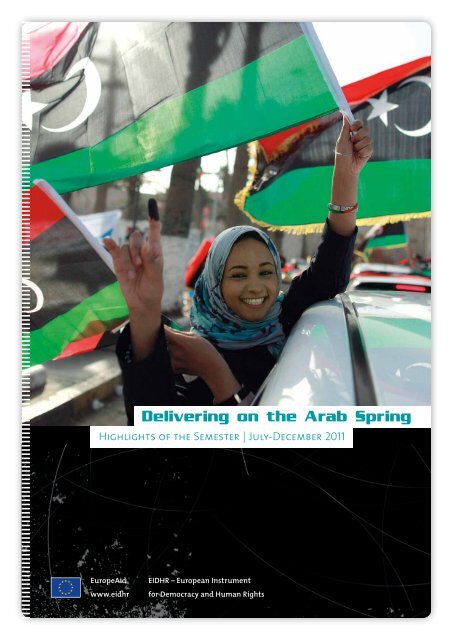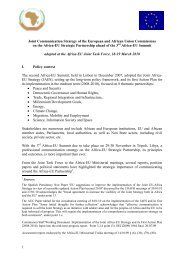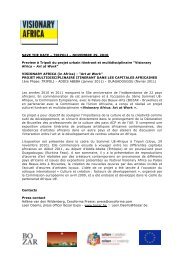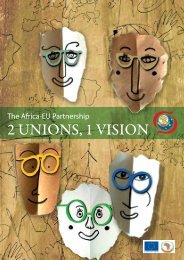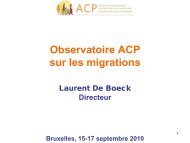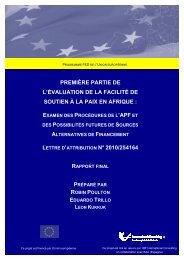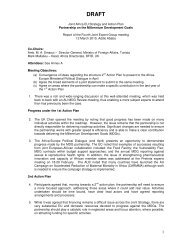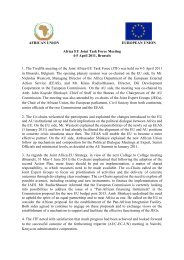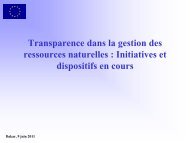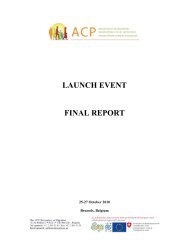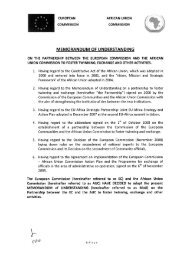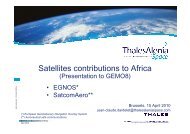Delivering on the Arab Spring - Africa-EU Partnership
Delivering on the Arab Spring - Africa-EU Partnership
Delivering on the Arab Spring - Africa-EU Partnership
- No tags were found...
You also want an ePaper? Increase the reach of your titles
YUMPU automatically turns print PDFs into web optimized ePapers that Google loves.
ForewordThe year 2011 was a busy year for democracy and human rights in our neighbourhood with<strong>the</strong> <strong>Arab</strong> <strong>Spring</strong>. One can <strong>on</strong>ly commend <strong>the</strong> courageous uprising of <strong>the</strong> <strong>Arab</strong> youth and beshocked by <strong>the</strong> current crackdowns <strong>on</strong> Syrian democrats.In resp<strong>on</strong>se to <strong>the</strong> changes initiated by Tunisian citizens, <strong>the</strong> <strong>EU</strong> immediatelyreviewed all financial assistance provided to its partners, and delivereda c<strong>on</strong>crete package of <strong>EU</strong> resp<strong>on</strong>ses to each <strong>Arab</strong> country. In parallel, <strong>the</strong>European Commissi<strong>on</strong> had already begun a fundamental review of <strong>the</strong>European Neighbourhood Policy, which was subsequently presented inMay 2011. An important feature of <strong>the</strong> renewed approach to <strong>the</strong> EuropeanNeighbourhood Policy has been <strong>the</strong> increased support for civil society, ei<strong>the</strong>rthrough direct financial support or greater policy dialogue. Civil societyorganisati<strong>on</strong>s are important agents of change and can play a crucial rolein promoting and defending human rights and fundamental values whileholding governments to account.The European Instrument for Democracy and Human Rights (EIDHR) has been an importantpart of this <strong>EU</strong> resp<strong>on</strong>se. It has delivered its added value and a specialised comp<strong>on</strong>ent to ourcrisis management toolbox. It has helped support democratic transiti<strong>on</strong> and mitigati<strong>on</strong> of<strong>the</strong> worst human rights violati<strong>on</strong>s.Defending human rights is a difficult task. The tragic fate of Ales Bialiastki, President of <strong>the</strong>Human Rights Centre Viasna, and Abdulhadi Al-Khawaja, President of <strong>the</strong> Bahrain Centre forHuman Rights, respectively sentenced in Belarus and Bahrain, reminds us of <strong>the</strong> outstandingcourage and motivati<strong>on</strong> of our partners from civil society.I am very proud of <strong>the</strong> results achieved in <strong>the</strong> Neighbourhood area. Some of <strong>the</strong> EIDHRactivities have created leverage to support l<strong>on</strong>g-term change; some have supported specificcases or individuals. These two dimensi<strong>on</strong>s are both important and interlinked.Finally, at a difficult financial time, it is more important than ever that every single euro ofpublic funds is put to good use. I am also proud that this has been d<strong>on</strong>e with <strong>the</strong> limited butessential resources of <strong>the</strong> EIDHR. We have been able to flexibly reorient our funding towards<strong>the</strong> areas of greatest need while maintaining a high rate of commitments and payments.We have also worked increasingly in liais<strong>on</strong> with o<strong>the</strong>r <strong>EU</strong> instruments, improving <strong>the</strong>coherence of <strong>the</strong> <strong>EU</strong> resp<strong>on</strong>se.In 2012, we will c<strong>on</strong>tinue <strong>the</strong> c<strong>on</strong>solidati<strong>on</strong> of our EIDHR activities, and c<strong>on</strong>tinue to use it tofur<strong>the</strong>r trigger democratic change and support defenders of human rights.Stefan FüleCommissi<strong>on</strong>er for Enlargement and <strong>the</strong> European Neighbourhood PolicyCover : Tripoli, Libya © Reuters2 Highlights of <strong>the</strong> Semester | <str<strong>on</strong>g>Delivering</str<strong>on</strong>g> <strong>on</strong> <strong>the</strong> <strong>Arab</strong> <strong>Spring</strong> | Foreword 1
C<strong>on</strong>tentIntroducti<strong>on</strong>41. The EIDHR’s added valuein <strong>the</strong> <strong>Arab</strong> <strong>Spring</strong>1.1. Capacity to act without host country c<strong>on</strong>sent1.2. Reactivity1.3 Complementarity9910112. Working <strong>on</strong> difficult casesin <strong>the</strong> regi<strong>on</strong>2.1. Defending human rights defenders2.2. Implementing <strong>the</strong> No Disc<strong>on</strong>nect Strategy:a special look at Internet freedom1313143. Operating in <strong>the</strong> countriesof <strong>the</strong> <strong>Arab</strong> <strong>Spring</strong>3.1 Supporting democratic transiti<strong>on</strong>3.2 Empowering civil society as an actor of change3.3 Mitigating human rights violati<strong>on</strong>s17172123| Tunis| Tunisia2 Highlight of <strong>the</strong> Semester | <str<strong>on</strong>g>Delivering</str<strong>on</strong>g> <strong>on</strong> Democracy© Reuters| C<strong>on</strong>tent 3
Introducti<strong>on</strong>This report highlights operati<strong>on</strong>s deployed by <strong>the</strong> European Instrument for Democracy andHuman Rights (EIDHR) as part of <strong>the</strong> <strong>EU</strong> support and resp<strong>on</strong>se to <strong>the</strong> <strong>Arab</strong> <strong>Spring</strong>. It underlineskey projects and activities implemented before, during, and immediately after <strong>the</strong><strong>Arab</strong> <strong>Spring</strong>. It should not be seen as exhaustive 1 .Despite <strong>the</strong> unexpected magnitude of <strong>the</strong> <strong>Arab</strong> <strong>Spring</strong> uprisings, <strong>the</strong> <strong>EU</strong> has been quick torecognise <strong>the</strong> challenges of <strong>the</strong> political and ec<strong>on</strong>omic transiti<strong>on</strong> faced by <strong>the</strong> regi<strong>on</strong> as awhole. It immediately reviewed its policy and adopted a new approach in its relati<strong>on</strong>shipswith its Sou<strong>the</strong>rn neighbours.The <strong>EU</strong>’s strategic resp<strong>on</strong>se to <strong>the</strong> <strong>Arab</strong> <strong>Spring</strong> came as early as 8 March 2011, with <strong>the</strong> jointcommunicati<strong>on</strong> of <strong>the</strong> <strong>EU</strong> High Representative and <strong>the</strong> European Commissi<strong>on</strong> proposing‘A partnership for democracy and shared prosperity with <strong>the</strong> Sou<strong>the</strong>rn Mediterranean’. Thiscommunicati<strong>on</strong> stresses <strong>the</strong> need for <strong>the</strong> <strong>EU</strong> to support wholeheartedly <strong>the</strong> demand for politicalparticipati<strong>on</strong>, dignity, freedom and employment opportunities, and sets out an approachbased <strong>on</strong> <strong>the</strong> respect of universal values and shared interests. It also proposes <strong>the</strong> ‘more formore’ principle, under which increased support is to be made available, <strong>on</strong> <strong>the</strong> basis of mutualaccountability, to those partner countries most advanced in <strong>the</strong> c<strong>on</strong>solidati<strong>on</strong> of reforms.This approach was fur<strong>the</strong>r elaborated in ano<strong>the</strong>r joint communicati<strong>on</strong> <strong>on</strong> 25 May 2011 whichinitiated <strong>the</strong> launch of ‘A new resp<strong>on</strong>se to a changing Neighbourhood’.EIDHR projects in <strong>the</strong> Middle East & North <strong>Africa</strong>YearN° of projects in Total number of Value of grants Total value of<strong>the</strong> regi<strong>on</strong>projects(<strong>EU</strong>R) in <strong>the</strong> grants (<strong>EU</strong>R)regi<strong>on</strong>The <strong>EU</strong> has an extensive array of instruments at its disposal. It supports democratisati<strong>on</strong>2007-2010 116 1 247 24 569 419 331 046 843through an appropriate mix of instruments tailored to <strong>the</strong> specific situati<strong>on</strong> of each2011 54 356 11 415 571 83 401 242country.While geographical programs support reforms and democratic instituti<strong>on</strong>-building, <strong>the</strong> EIDHRCountry-Based offers a comprehensive Support Scheme package (CBSS) allocati<strong>on</strong>s of local acti<strong>on</strong>s 2007-2013 encouraging to Morocco, Algeria, political Tunisia, pluralism, Libya, Egypt, empoweringOPT, disenfranchised Yemen, Jordan, Syria groups, % of total defending CBSS allocati<strong>on</strong>s victims and promoting dialogue, fostering mediati<strong>on</strong>,20% transparency, accountability and c<strong>on</strong>sultati<strong>on</strong>.15%The EIDHR works in synergy. For example in Haiti, geographical instruments focused <strong>on</strong> <strong>the</strong>rec<strong>on</strong>structi<strong>on</strong> of democratic instituti<strong>on</strong>s. N<strong>on</strong> State Actors Initiatives helped rebuilding civilsociety. The Instrument for Stability supported electi<strong>on</strong> assistance and dialogue between.10%The EIDHR brought its added value, in providing electi<strong>on</strong> experts advocating a peaceful outcomeof electi<strong>on</strong>s and 3130 local observers streng<strong>the</strong>ning c<strong>on</strong>fidence and ownership of <strong>the</strong>process. 5%The new approach of <strong>the</strong> European Neighbourhood Policy (ENP) aims to:‘provide greater support to partners engaged in building deep democracy – <strong>the</strong> kind thatlasts because <strong>the</strong> right to vote is accompanied by rights to exercise free speech, form competingpolitical parties, receive impartial justice from independent judges, security from accountablepolice and army forces, access to a competent and n<strong>on</strong>-corrupt civil service – and o<strong>the</strong>rcivil and human rights that many Europeans take for granted, such as <strong>the</strong> freedom of thought,c<strong>on</strong>science and religi<strong>on</strong>.’Planned acti<strong>on</strong>s to achieve this aim include:• adapting levels of <strong>EU</strong> support to partners according to progress <strong>on</strong> political reforms andbuilding deep democracy;• establishing partnerships in each neighbouring country and make <strong>EU</strong> support more accessibleto civil society organisati<strong>on</strong>s (CSOs) through a dedicated Civil Society Facility;• supporting <strong>the</strong> establishment of a European Endowment for Democracy to help politicalparties, n<strong>on</strong>-registered n<strong>on</strong> governmental organisati<strong>on</strong>s (NGOs) and trade uni<strong>on</strong>s ando<strong>the</strong>r social partners;• promoting media freedom by supporting CSOs’ unhindered access to <strong>the</strong> Internet and <strong>the</strong>use of electr<strong>on</strong>ic communicati<strong>on</strong>s technologies;• reinforcing human rights dialogues.1Complete and detailedinformati<strong>on</strong> is available <strong>on</strong> <strong>the</strong>various compendia of activities,which can be found <strong>on</strong>line atwww.eidhr.eu.0% The EIDHR is reactive. An immediate assistance was sent to <strong>the</strong> reform committee in Tunisiato design <strong>the</strong> 2007 roadmap 2008 transiti<strong>on</strong> 2009and help 2010 civil society 2011 c<strong>on</strong>tribute 2012 2013 to <strong>the</strong> process. While <strong>the</strong>Instrument for Stability will assist key NGOs by topping up <strong>on</strong> existing EIDHR supports, o<strong>the</strong>rCBSS allocati<strong>on</strong>s 2007-2013 to Morocco, Algeria, Tunisia, Libya, Egypt, OPT, Yemen, Jordan, Syriainstruments will intervene to help justice, youth and rural areas. The EIDHR will also trainin <strong>EU</strong>R billi<strong>on</strong>political parties, support free press and media in particular blogs and Internets, watch dog<strong>the</strong> 15democratic transiti<strong>on</strong>, and support civic educati<strong>on</strong> <strong>on</strong> democracy. Later it will deploythousand of local observers and an <strong>EU</strong> Electi<strong>on</strong> Observati<strong>on</strong> Missi<strong>on</strong>.12The EIDHR acts without host country c<strong>on</strong>sent. For example in Belarus. While <strong>the</strong> instrumentalso 9 supports democratic educati<strong>on</strong> at graduate level of future young leaders abroad, athome, it tries to mitigate unfair criminalisati<strong>on</strong> of democratic activists impris<strong>on</strong>ed for being6in <strong>the</strong> oppositi<strong>on</strong>. The defenders of <strong>the</strong> victims (such as lawyers) have in turn to be defended(through our Human Right Defender system) as <strong>the</strong>y can get impris<strong>on</strong>ed for taking up <strong>the</strong>3cases of pro-democracy activists.0The EIDHR 2007 works in 2008 difficult 2009 c<strong>on</strong>diti<strong>on</strong>s. 2010In a coordinated 2011 2012project 2013with <strong>the</strong> US Nati<strong>on</strong>alEndowment for Democracy sharing same operati<strong>on</strong>al facilities, <strong>the</strong> EIDHR finds informati<strong>on</strong>and ensures free broadcasting in North Korea regarding some 200.000 political pris<strong>on</strong>ers ininternment camps (source Amnesty Internati<strong>on</strong>al). After NED’s withdrawal for administrativecomplexities, <strong>the</strong> project is now <strong>on</strong>ly supported by <strong>the</strong> <strong>EU</strong>.4 Highlights of <strong>the</strong> Semester | <str<strong>on</strong>g>Delivering</str<strong>on</strong>g> <strong>on</strong> <strong>the</strong> <strong>Arab</strong> <strong>Spring</strong> 1 | EIDHR’s added value in supporting | Introducti<strong>on</strong> Democracy 5
2Working <strong>on</strong> difficultcases in <strong>the</strong> regi<strong>on</strong>Difficult cases, including working in countries where human rights are most at risk 3 , representcurrently 20 % of EIDHR activities. Since 2007, <strong>the</strong> EIDHR has supported more than 100 suchprojects to a total of <strong>EU</strong>R 60 milli<strong>on</strong>. In <strong>the</strong> <strong>Arab</strong> <strong>Spring</strong> regi<strong>on</strong>, <strong>the</strong> EIDHR mobilised funds <strong>on</strong>numerous difficult cases.2.1. Defending human rights defendersSince January 2011, <strong>the</strong> new and flexible EIDHR Small Grant Facility 4 has covered numerousindividual cases of victims of anti-democratic repressi<strong>on</strong>. This Facility proved particularlyuseful in <strong>the</strong> c<strong>on</strong>text of <strong>the</strong> <strong>Arab</strong> <strong>Spring</strong>, and 25 % of <strong>the</strong> small grants allocated since <strong>the</strong>beginning of 2011 directly benefited human rights defenders (HRDs) in North <strong>Africa</strong> and <strong>the</strong>Middle East. More than 70 HRDs from countries involved in <strong>the</strong> <strong>Arab</strong> <strong>Spring</strong> were individuallyhelped by <strong>the</strong> Facility since <strong>the</strong> beginning of <strong>the</strong> uprisings in 2011. In additi<strong>on</strong>, many moredefenders were protected via <strong>the</strong> capacity to re-grant funds allocated to NGOs in <strong>the</strong> regi<strong>on</strong>.Support to HRDs is also provided through <strong>EU</strong> global projects that were activated in <strong>the</strong> regi<strong>on</strong>during <strong>the</strong> <strong>Arab</strong> <strong>Spring</strong>. <strong>EU</strong> projects, run by <strong>the</strong> Internati<strong>on</strong>al Federati<strong>on</strong> for Human Rights(FIDH) and Protecti<strong>on</strong> Internati<strong>on</strong>al, provided advocacy <strong>on</strong> human rights situati<strong>on</strong>s, mitigatedrisks encountered by HRDs, and reinforced <strong>the</strong> capacity of defenders to work in<strong>the</strong> regi<strong>on</strong>.A dedicated <strong>EU</strong> project implemented by <strong>the</strong> Euro-Mediterranean Foundati<strong>on</strong> of Support toHuman Rights Defenders (EMHRF) provides financial support to hundreds of HRDs in emergencysituati<strong>on</strong>s caused by <strong>the</strong>ir activities in <strong>the</strong> Sou<strong>the</strong>rn Mediterranean regi<strong>on</strong>.In additi<strong>on</strong>, <strong>the</strong> <strong>EU</strong> supports <strong>the</strong> Euro-Mediterranean Human Rights Network (EMHRN).Encompassing more than 80 organisati<strong>on</strong>s from 30 countries of <strong>the</strong> regi<strong>on</strong>, <strong>the</strong> networkactively highlights <strong>the</strong> human rights situati<strong>on</strong> and supports <strong>the</strong> development of democraticinstituti<strong>on</strong>s, <strong>the</strong> rule of law, and <strong>the</strong> equality of women and men throughout <strong>the</strong> Middle East.| Budaiya| Bahrain12 Highlights of <strong>the</strong> Semester | <str<strong>on</strong>g>Delivering</str<strong>on</strong>g> <strong>on</strong> <strong>the</strong> <strong>Arab</strong> <strong>Spring</strong>© Reuters3See secti<strong>on</strong> 1.1.4This Facility (up to <strong>EU</strong>R 10 000per case) permits rapid acti<strong>on</strong>and covers activities such asphysical protecti<strong>on</strong>, legal fees,rehabilitati<strong>on</strong>, and out-ofcountryrelocati<strong>on</strong> or supportto families of victims.Moreover, <strong>the</strong> EIDHR supports Fr<strong>on</strong>t Line Defenders which provides rapid and practical supportto pro-democracy defenders at risk in <strong>the</strong> Middle East and <strong>the</strong> Gulf regi<strong>on</strong>. Mr Abdulhadial-Khawaja, Fr<strong>on</strong>t Line Protecti<strong>on</strong> Coordinator for <strong>the</strong> Middle East and North <strong>Africa</strong>, formerPresident of <strong>the</strong> Bahrain Center for Human Rights, and award winner of <strong>the</strong> 2005 <strong>Arab</strong>Programme for Human Rights Defenders, is still under arbitrary detenti<strong>on</strong> following prodemocracyprotests during <strong>the</strong> Bahraini uprising. Fears for his life have been expressed followingallegati<strong>on</strong>s of torture.2 | Working <strong>on</strong> difficult cases in <strong>the</strong> regi<strong>on</strong> 13
The EIDHR also supports <strong>the</strong> protecti<strong>on</strong> of HRDs locally, for example in <strong>the</strong> OccupiedPalestinian Territories through a project implemented by <strong>the</strong> Israeli Informati<strong>on</strong> Centerfor Human Rights in <strong>the</strong> Occupied Territories, Associati<strong>on</strong> B’Tselem. The Centre developsand implements new and complementary mechanisms to protect n<strong>on</strong>-violent protests,activism and HRDs in <strong>the</strong> Territories.The EIDHR has invested in Internet access l<strong>on</strong>g before <strong>the</strong> <strong>Arab</strong> <strong>Spring</strong>. Indeed, it was part of<strong>the</strong> <strong>the</strong>matic points that <strong>the</strong> instrument chose to focus <strong>on</strong> in its 2011-2013 Strategy Paperadopted <strong>on</strong> 21 April 2010. The <strong>on</strong>-going 2012 global call for proposals focuses <strong>on</strong> projects tofight cyber-censorship and protect c<strong>on</strong>fidentiality of activists.2.2 Implementing <strong>the</strong> No Disc<strong>on</strong>nect Strategy:a special look at Internet freedomsThe <strong>Arab</strong> <strong>Spring</strong> dem<strong>on</strong>strated <strong>the</strong> importance of Internet access in a startling manner. Callsto ga<strong>the</strong>r for peaceful protests and against human rights abuses were both relayed wi<strong>the</strong>xtreme rapidity thanks to social networking during <strong>the</strong> revoluti<strong>on</strong>s of 2011. That is why <strong>the</strong>No Disc<strong>on</strong>nect Strategy (NDS) was launched in March 2011 5 to fur<strong>the</strong>r support suchmovements.The No Disc<strong>on</strong>nect Strategy (NDS) aims at:(1) providing citizens living in n<strong>on</strong>-democratic regimes with <strong>the</strong> technological tools <strong>the</strong>yneed to shield <strong>the</strong>mselves from indiscriminate surveillance or bypass disproporti<strong>on</strong>aterestricti<strong>on</strong>s <strong>on</strong> <strong>the</strong>ir freedom to communicate;(2) educating citizens about <strong>the</strong> risks and opportunities of <strong>the</strong> Internet and ICTs, in particularwhen operating in high-risk c<strong>on</strong>diti<strong>on</strong>s and when <strong>the</strong>ir security and privacy couldbe compromised;(3) obtaining high-quality, real-time informati<strong>on</strong> <strong>on</strong> what is happening <strong>on</strong> <strong>the</strong> ground, beit censorship and disc<strong>on</strong>necti<strong>on</strong> of Internet communicati<strong>on</strong>s, or <strong>the</strong> approval of laws andpolicies that could put citizens in danger when exercising <strong>the</strong>ir basic human rights and;(4) fostering cooperati<strong>on</strong> am<strong>on</strong>g different stakeholders and various public authorities thatare working to achieve <strong>the</strong>se important, comm<strong>on</strong> goals.5Joint Communicati<strong>on</strong> of<strong>the</strong> Commissi<strong>on</strong> and <strong>the</strong>High Representative of <strong>the</strong>Uni<strong>on</strong> for Foreign Affairs andSecurity Policy ‘<strong>Partnership</strong>for Democracy and SharedProsperity with <strong>the</strong> Sou<strong>the</strong>rnMediterranean’, COM(2011)200 of 8 March 2011.© ReutersAmman |Jordan |EIDHR 2011-2013 Strategy Paper:39. Within <strong>the</strong> framework of <strong>the</strong> enhancement of<strong>the</strong> respect for human rights and fundamentalfreedoms in countries where <strong>the</strong>y are most at risk(objective 1), activities to be supported will focusin particular <strong>on</strong>:……………..ii) <strong>the</strong> right to freedom of opini<strong>on</strong> and expressi<strong>on</strong> including artistic and cultural expressi<strong>on</strong>,<strong>the</strong> right to informati<strong>on</strong> and to communicate, including freedom of <strong>the</strong> media, fight againstcensorship, and access to <strong>the</strong> Internet;In Syria, a project protects <strong>the</strong> Internet freedom of independent bloggers, writers and journalists.These activists are trained to circumvent Internet censorship and to protect <strong>the</strong>mselvesat <strong>the</strong> digital level. Because of <strong>the</strong> risk that such activities involve, <strong>the</strong> project alsophysically protects activists, both in normal c<strong>on</strong>diti<strong>on</strong>s and in cases of emergency. This acti<strong>on</strong>c<strong>on</strong>tributes to maintain <strong>the</strong> flow of informati<strong>on</strong> from independent sources in Syria.The EIDHR also supports freedom of expressi<strong>on</strong> in Yemen. A project targets legislati<strong>on</strong> regarding<strong>the</strong> media and <strong>the</strong> Internet. It tries to put media and Internet freedom at <strong>the</strong> top of <strong>the</strong>political agenda as well as actively working towards <strong>the</strong> formulati<strong>on</strong> of new laws to streng<strong>the</strong>n<strong>the</strong> positi<strong>on</strong> of human rights activists in <strong>the</strong> country. It also improves access to informati<strong>on</strong>and freedom of speech for every citizen.An EIDHR programme implemented by Reporters Sans Fr<strong>on</strong>tières protects journalists andbloggers, especially <strong>the</strong> young and inexperienced <strong>on</strong>es. It provides <strong>the</strong>m with administrative,material or financial support when needed or in <strong>the</strong> most extreme cases moves <strong>the</strong>m to asafe locati<strong>on</strong> and helps <strong>the</strong>m c<strong>on</strong>tinue working. The programme also provides judicial supportfor journalists and bloggers that are detained or facing a trial. Finally, advocacy isundertaken at all levels of power to improve <strong>the</strong> respect for security and working c<strong>on</strong>diti<strong>on</strong>sof journalists, thus safeguarding freedom of speech and opini<strong>on</strong>.14 Highlights of <strong>the</strong> Semester | <str<strong>on</strong>g>Delivering</str<strong>on</strong>g> <strong>on</strong> <strong>the</strong> <strong>Arab</strong> <strong>Spring</strong>2 | Working <strong>on</strong> difficult cases in <strong>the</strong> regi<strong>on</strong> 15
3Operating in <strong>the</strong> countriesof <strong>the</strong> <strong>Arab</strong> <strong>Spring</strong>In 2011 al<strong>on</strong>e, 54 new EIDHR projects were set up in <strong>the</strong> <strong>Arab</strong> <strong>Spring</strong> regi<strong>on</strong>. Below are examplesof projects that helped support democratic transiti<strong>on</strong>, empowering civil society as an actorof change and mitigating human rights violati<strong>on</strong>s.3.1 Supporting democratic transiti<strong>on</strong>The EIDHR is supporting democratic transiti<strong>on</strong> via different means. It focuses <strong>on</strong> support toprogressive structural reforms in countries where <strong>the</strong> situati<strong>on</strong> is stable and <strong>on</strong> support todemocracy building, electi<strong>on</strong>s and rec<strong>on</strong>ciliati<strong>on</strong> in cases of regime change or more rapidtransiti<strong>on</strong>.Supporting progressive reformsThe EIDHR project implemented by Associati<strong>on</strong> de soutien au Collectif Démocratie etModernité reinforces <strong>the</strong> rule of law and democracy in Morocco through a dialogue betweenelected representatives and civil society, establishing c<strong>on</strong>fidence in parliamentary instituti<strong>on</strong>s.It builds, inter alia, <strong>the</strong> capacity of both members of <strong>the</strong> Moroccan parliament and civilsociety. It proposes reforms to increase <strong>the</strong> independence of parliament and promotes itsgood practices.In Yemen <strong>the</strong> project ‘Watch and help <strong>the</strong> parliament’ implemented by <strong>the</strong> Yemen PollingCenter streng<strong>the</strong>ns <strong>the</strong> accountability of <strong>the</strong> Yemen’s House of Representatives. The projectm<strong>on</strong>itors <strong>the</strong> performance of public reporting by parliamentarians. It supports opini<strong>on</strong> polls<strong>on</strong> public percepti<strong>on</strong> and aids public access to informati<strong>on</strong>.An EIDHR project implemented by <strong>the</strong> Jordanian Center for Civic Educati<strong>on</strong> is increasing<strong>the</strong> amount of voters am<strong>on</strong>g young people in five districts in Jordan. Using <strong>the</strong> Internet andtraditi<strong>on</strong>al media, <strong>the</strong> project ‘Hear my voice: I can vote now!’ educates youth about electoralfreedom, rights and obligati<strong>on</strong>s as well as internati<strong>on</strong>al standards. Teachers are also trained,enabling <strong>the</strong>m to more widely disseminate up-to-date informati<strong>on</strong>.| Giza| EgyptA project implemented by <strong>the</strong> Adala Justice Associati<strong>on</strong> supports <strong>the</strong> reforms of <strong>the</strong> variouscodes that regulate <strong>the</strong> work of judges, lawyers and o<strong>the</strong>r justice officials in Morocco. Theproject helps improve <strong>the</strong> impartiality and independence of <strong>the</strong> judicial system. It also workstowards <strong>the</strong> formulati<strong>on</strong> and adopti<strong>on</strong> of best practice to improve transparency, fairness andaccountability. It encourages <strong>the</strong> judiciary to become a c<strong>on</strong>flict-resoluti<strong>on</strong> actor ra<strong>the</strong>r thanalways a c<strong>on</strong>flict referee.© Reuters16 Highlight of <strong>the</strong> Semester | <str<strong>on</strong>g>Delivering</str<strong>on</strong>g> <strong>on</strong> Democracy 3 | Operating in <strong>the</strong> countries of <strong>the</strong> <strong>Arab</strong> <strong>Spring</strong> 17
© EC/ScagnettiAn EIDHR project advocates for and develops <strong>the</strong> capacity of Libyan pris<strong>on</strong> instituti<strong>on</strong>s toensure <strong>the</strong> respect of human rights and build a transparent administrative process in accordancewith internati<strong>on</strong>al standards in <strong>the</strong> field. Implemented by <strong>the</strong> Intercultural Institutefrom Timisoara, this project is developed in partnership with <strong>the</strong> Nati<strong>on</strong>al Administrati<strong>on</strong>of Penitentiaries from Romania (NAP). This ‘peer-to-peer’ project shares benefits from <strong>the</strong>Romanian experience of transiti<strong>on</strong> and includes capacity building activities and <strong>the</strong> settingup of a registrati<strong>on</strong> system of detainees.Supporting electi<strong>on</strong>s and rec<strong>on</strong>ciliati<strong>on</strong>An <strong>EU</strong> project implemented by a c<strong>on</strong>sortium comprising <strong>the</strong> Club de Madrid (CdM), <strong>the</strong>Ne<strong>the</strong>rlands Institute for Multiparty Democracy (NIMD), <strong>the</strong> European <strong>Partnership</strong> forDemocracy (EPD), Internati<strong>on</strong>al IDEA and <strong>the</strong> European Centre for Electoral Support (ECES)provides support for <strong>the</strong> organisati<strong>on</strong> of local electi<strong>on</strong>s in Libya in a comprehensive rec<strong>on</strong>ciliati<strong>on</strong>process. The project has allowed <strong>the</strong> first electi<strong>on</strong>s ever held in cities such as Benghazi,or Derna to take place. It is also supporting Libyan processes such as <strong>the</strong> Council of <strong>the</strong> Wisethat promotes dialogue am<strong>on</strong>g all political and tribal leaders, key factors towards achievingrec<strong>on</strong>ciliati<strong>on</strong> and democracy.In Egypt, while <strong>the</strong> <strong>EU</strong> was not invited to observe <strong>the</strong> electi<strong>on</strong>s, an EIDHR project supported<strong>the</strong> m<strong>on</strong>itoring by domestic observers of <strong>the</strong> 2010 Parliamentary and 2011 PresidentialElecti<strong>on</strong>s. Implemented by <strong>the</strong> Andalus Institute for Tolerance and anti-Violence Studies,this project helped Egyptian civil society itself to own <strong>the</strong> observati<strong>on</strong> process. It allowed for<strong>the</strong> training and deployment of hundreds of electi<strong>on</strong> and media observers, as well as a presscampaign <strong>on</strong> <strong>the</strong> electi<strong>on</strong> results.EIDHR’s support to democratic electi<strong>on</strong>s: <strong>the</strong> example of TunisiaThe EIDHR deployed a comprehensive resp<strong>on</strong>se package to <strong>the</strong> 2011 electi<strong>on</strong> for <strong>the</strong> first freeTunisian C<strong>on</strong>stituent Assembly.A technical team of experts was immediately deployed to assist <strong>the</strong> Tunisian nati<strong>on</strong>al electi<strong>on</strong>committee in its organisati<strong>on</strong> of <strong>the</strong> electi<strong>on</strong>s.An electi<strong>on</strong> has no chance of being democratic and inclusive if its main actors, political parties,do not understand how <strong>the</strong> process works. An EIDHR project implemented by <strong>the</strong> K<strong>on</strong>rad-Adenauer-Stiftung helps political parties to improve <strong>the</strong>ir campaigning skills and trains<strong>the</strong>m about inter-parties dialogues. This project resulted in <strong>the</strong> elaborati<strong>on</strong> and subscripti<strong>on</strong>by parties of a code of good c<strong>on</strong>duct during <strong>the</strong> electi<strong>on</strong>s and bey<strong>on</strong>d.An electi<strong>on</strong>, even if carried out in a fair way, cannot be c<strong>on</strong>sidered fair if <strong>the</strong> populati<strong>on</strong> is notproperly informed about <strong>the</strong> choice it makes. An <strong>EU</strong> project implemented by <strong>the</strong> DeutscheWelle Academy fostered <strong>the</strong> best coverage possible for both <strong>the</strong> campaign and <strong>the</strong> electi<strong>on</strong>.This project trained over 50 journalists from televisi<strong>on</strong>, radio, written press and new mediato portray informati<strong>on</strong> in a professi<strong>on</strong>al and impartial way. This project also trains teachersof journalism in <strong>the</strong> Institute of Press and Informati<strong>on</strong> Sciences so that new generati<strong>on</strong>s ofjournalists may c<strong>on</strong>tinue to learn democratic practice and values.Following <strong>the</strong> official invitati<strong>on</strong> of <strong>the</strong> government, <strong>the</strong> EIDHR deployed an <strong>EU</strong> Electi<strong>on</strong>Observati<strong>on</strong> Missi<strong>on</strong> (<strong>EU</strong> EOM) to observe and assess all aspects of <strong>the</strong> electoral process.Based <strong>on</strong> <strong>the</strong> observati<strong>on</strong> of 19 % of polling stati<strong>on</strong>s <strong>the</strong> missi<strong>on</strong>’s report provided recommendati<strong>on</strong>sfor improvement.| Tunis| TunisiaFinally, c<strong>on</strong>scious that democracy is a processthat does not come from <strong>the</strong> outside but mustbe owned by <strong>the</strong> populati<strong>on</strong>, an EIDHR projectfostered domestic observati<strong>on</strong> of <strong>the</strong> electi<strong>on</strong>.Implemented by <strong>the</strong> Associati<strong>on</strong> Tunisienne PourL’Eveil Démocratique, <strong>the</strong> project trained anddispatched over 2500 domestic observers in all24 Governorates of Tunisia.© EC/Scagnetti© EC/Scagnetti18 Highlights of <strong>the</strong> Semester | <str<strong>on</strong>g>Delivering</str<strong>on</strong>g> <strong>on</strong> <strong>the</strong> <strong>Arab</strong> <strong>Spring</strong>3 | Operating in <strong>the</strong> countries of <strong>the</strong> <strong>Arab</strong> <strong>Spring</strong> 19
3.2 Empowering civil society as an actor of changeWorking with, for and through CSOs is a major characteristic of <strong>the</strong> EIDHR. The instrumenthas been widely used in <strong>the</strong> regi<strong>on</strong> of <strong>the</strong> <strong>Arab</strong> <strong>Spring</strong> to empower civil society as an actor ofchange.| Tunis| Tunisia© EC/ScagnettiEmpowering human rights defenders as actors of changeThe Algerian League for <strong>the</strong> Defence of Human Rights (LADDH) implements an EIDHR projectthat streng<strong>the</strong>ns <strong>the</strong> capacity of civil society to advocate for human rights and democracyin <strong>the</strong> wilayas (districts) of Tizi-Ouzou and Bajaïa in Algeria. It uses modern media to improvecivil society’s access to informati<strong>on</strong> about human rights. It organises training that increasescivil society’s capacity to be an active and influent actor in <strong>the</strong> democratisati<strong>on</strong> process andcoordinates its mobilisati<strong>on</strong> and advocacy regarding human rights issues.In <strong>the</strong> Occupied Palestinian Territories, <strong>the</strong> EIDHR is enhancing <strong>the</strong> effectiveness of an independentjudiciary and empowering civil society’s m<strong>on</strong>itoring of <strong>the</strong> judiciary. Implementedby <strong>the</strong> Coaliti<strong>on</strong> for Accountability and Integrity – Aman, this project helps improve <strong>the</strong>role of <strong>the</strong> judicial authorities in <strong>the</strong> protecti<strong>on</strong> of HRDs It builds <strong>the</strong> capacity of <strong>the</strong> judiciaryfor integrity, accountability, and independence and fighting corrupti<strong>on</strong>. Target groups include<strong>the</strong> High Judicial Council, <strong>the</strong> Public Prosecutor’s Office, and <strong>the</strong> Ministry of Justice.Empowering local journalists and media as actors of changeIn Morocco an <strong>EU</strong>-funded project supports community media for citizens’ informati<strong>on</strong>. Theproject is empowering CSOs in <strong>the</strong>ir role of propositi<strong>on</strong>, advocacy and m<strong>on</strong>itoring reform of<strong>the</strong> communicati<strong>on</strong>s sector. Implemented by <strong>the</strong> Forum des Alternatives Maroc (FMAS), thisproject supports <strong>on</strong>-going reforms to guarantee freedom of expressi<strong>on</strong>, pluralism, modernity,respect of rights and <strong>the</strong> opening of <strong>the</strong> media to include community radio stati<strong>on</strong>s.An EIDHR project implemented by <strong>the</strong> Ma’an Televisi<strong>on</strong> Network Associati<strong>on</strong> improves <strong>the</strong>media’s capacity to perform its duty with <strong>the</strong> end goal of promoting freedom of <strong>the</strong> pressand access to informati<strong>on</strong> in <strong>the</strong> Occupied Palestinian Territories. The project trained over60 journalists from <strong>the</strong> written press, televisi<strong>on</strong> networks, radio stati<strong>on</strong>s and <strong>on</strong>line newsagencies to better investigate and report news, especially <strong>on</strong> human rights, governance andaccountability issues. This project also improves <strong>the</strong> capacity of journalists to resp<strong>on</strong>d toviolati<strong>on</strong>s, thanks to <strong>the</strong> creati<strong>on</strong> of a professi<strong>on</strong>al support network.© Reuters| Rabat| MoroccoEmpowering youth as an actor of changeIn Yemen, <strong>the</strong> EIDHR c<strong>on</strong>tributes to <strong>the</strong> development of <strong>the</strong> youth movement. A project implementedby The Ranin Al-Yemen Foundati<strong>on</strong> (Res<strong>on</strong>ate!) builds <strong>the</strong> capacity and peer-to-peercoaching of youth groups within Yemen’s protest movement, ensuring an active and inclusiveparticipati<strong>on</strong> of young people in Yemen’s democratic and political processes.20 Semester’s Highlights highlight of <strong>the</strong> Semester | <str<strong>on</strong>g>Delivering</str<strong>on</strong>g> | <str<strong>on</strong>g>Delivering</str<strong>on</strong>g> <strong>on</strong> Democracy <strong>on</strong> <strong>the</strong> <strong>Arab</strong> <strong>Spring</strong>3 | Operating in <strong>the</strong> countries of <strong>the</strong> <strong>Arab</strong> <strong>Spring</strong> 21
In <strong>the</strong> Occupied Palestinian Territories, <strong>the</strong> El Wedad Society for CommunityRehabilitati<strong>on</strong> is implementing an EIDHR project <strong>on</strong> youth and human rights. This projectenhances human rights awareness in <strong>the</strong> Gaza Strip by providing new graduates with <strong>the</strong>necessary skills and capability of spreading and promoting human rights culture, andm<strong>on</strong>itoring human rights issues and fundamental freedoms. Activities include awarenessraisingsessi<strong>on</strong>s, training of trainers for human rights coupled with leadership skills,human rights sessi<strong>on</strong>s for university students, and technical training about <strong>the</strong> media.Empowering women as actors of changeIn Libya, an EIDHR project supports women in effectively participating in <strong>the</strong> c<strong>on</strong>structi<strong>on</strong>of a free and democratic Libya. The project also fights against any form of discriminati<strong>on</strong>harming <strong>the</strong> full exercise of citizenship rights, especially for women. Implemented by <strong>the</strong>Nati<strong>on</strong>al C<strong>on</strong>sortium of Libyan Women, <strong>the</strong> project allowed <strong>the</strong> establishment of anefficient women’s organisati<strong>on</strong>s network, a comprehensive training and capacity programmeand an efficient lobby for <strong>the</strong> active involvement of women in public life. Thisproject has c<strong>on</strong>tributed to <strong>the</strong> electi<strong>on</strong> of several female candidates in local electi<strong>on</strong>s andm<strong>on</strong>itors political processes for any policy which could exclude or harm vulnerable people.The EIDHR supports a project in Egypt with <strong>the</strong> objective of streng<strong>the</strong>ning women’sinvolvement in public life. This project, run by <strong>the</strong> One World Foundati<strong>on</strong>, increased <strong>the</strong>amount of women winning parliamentary electi<strong>on</strong>s. It trains women to campaign, fundraise,network and assess a community’s needs. Training, informati<strong>on</strong> sessi<strong>on</strong>s andwomen-friendly material are also provided to campaign managers, community leadersand media professi<strong>on</strong>als.3.3. Mitigating human rights violati<strong>on</strong>sLast but not least, activity to mitigate human rights violati<strong>on</strong>s represents a big proporti<strong>on</strong>of EIDHR activities in <strong>the</strong> countries of <strong>the</strong> <strong>Arab</strong> <strong>Spring</strong>, from <strong>the</strong> aboliti<strong>on</strong> of <strong>the</strong> death penaltyand torture, to <strong>the</strong> promoti<strong>on</strong> of ec<strong>on</strong>omic, social and cultural rights, through <strong>the</strong> fightagainst discriminati<strong>on</strong> and <strong>the</strong> protecti<strong>on</strong> of fundamental rights.Fighting against tortureIn Libya, an EIDHR project supports torture victims and victims of enforced disappearance.Implemented by <strong>the</strong> Internati<strong>on</strong>al Rehabilitati<strong>on</strong> Council for Torture Victims and <strong>the</strong>Organisati<strong>on</strong> m<strong>on</strong>diale c<strong>on</strong>tre la torture (OMCT), this project treats and helps rehabilitatevictims of organised rape by Gaddafi troops. It also advocates effective preventi<strong>on</strong> of tortureand relative changes and reform.An <strong>EU</strong> project run by <strong>the</strong> Transparency Center for Studies andResearch improves <strong>the</strong> preventi<strong>on</strong> of torture in Yemen.Through <strong>the</strong> educati<strong>on</strong> of over 500 officers am<strong>on</strong>g <strong>the</strong> police,general prosecutors and jail officials as well as religious andpolitical leaders, this project fosters an anti-torture culturein <strong>the</strong> instituti<strong>on</strong>s. Informati<strong>on</strong> is provided to detaineesregarding <strong>the</strong>ir rights under nati<strong>on</strong>al law and internati<strong>on</strong>alagreements. The project also provides legal support for torturevictims, helping <strong>the</strong>m in <strong>the</strong>ir rehabilitati<strong>on</strong>, and fightsagainst impunity for perpetrators of torture.Empowering social partners as actors of changeIn a project implemented by its Italian counterpart, <strong>the</strong> ItalianGeneral C<strong>on</strong>federati<strong>on</strong> of Labour (CGIL), <strong>the</strong> EIDHR has beensupporting <strong>the</strong> major Trade Uni<strong>on</strong> of Tunisian Workers (UGTT).The project advocated and developed c<strong>on</strong>crete acti<strong>on</strong> todefend and promote freedom of associati<strong>on</strong> and various civiland labour rights. Trade uni<strong>on</strong>s played a key role in <strong>the</strong> uprising,by temporarily ensuring public functi<strong>on</strong>s of <strong>the</strong> failedstate (such as community security against looting). UGTT isnow a key political player and deeply involved with <strong>the</strong>reforms.In Morocco, a project carried out by <strong>the</strong> Organisati<strong>on</strong> Démocratique du Travail improvesworkers’ c<strong>on</strong>diti<strong>on</strong>s and <strong>the</strong> respect of <strong>the</strong>ir human rights. This is d<strong>on</strong>e through <strong>the</strong> trainingof over a hundred uni<strong>on</strong> representatives both at <strong>the</strong> nati<strong>on</strong>al and local level <strong>on</strong> <strong>the</strong>subjects of human rights, democracy, <strong>the</strong> rule of law and governance. Through <strong>the</strong>setrained uni<strong>on</strong> representatives, <strong>the</strong> project works towards a better educati<strong>on</strong> for all workerswith regard to <strong>the</strong> protecti<strong>on</strong> of <strong>the</strong>ir judicial, social, ec<strong>on</strong>omic and cultural rights.| Sfax| TunisiaTransparency Center /Karama project |Yemen |Enhancing access to ec<strong>on</strong>omic and social rightsThe EIDHR also supports <strong>the</strong> access to ec<strong>on</strong>omic and social rights for migrant workers.A project implemented by <strong>the</strong> Internati<strong>on</strong>al Labour Organizati<strong>on</strong> helps Palestinian refugeesin Leban<strong>on</strong> have suitable employment c<strong>on</strong>diti<strong>on</strong>s and social protecti<strong>on</strong>. The project ga<strong>the</strong>rsall possible informati<strong>on</strong> available <strong>on</strong> Palestinian workers in <strong>the</strong> country in order to produceinternati<strong>on</strong>ally comparable data. This is used to propose policy changes that result in animprovement of c<strong>on</strong>diti<strong>on</strong>s for Palestinian workers. The project also uses this data to helpimprove <strong>the</strong> existing m<strong>on</strong>itoring and advocacy capacity of civil society with <strong>the</strong> goal of reducingdiscriminati<strong>on</strong> of Palestinian refugees in <strong>the</strong> Lebanese labour market as much aspossible.In Egypt, a project helps remove legislative and judicial obstacles to ec<strong>on</strong>omic and socialrights. Implemented by <strong>the</strong> <strong>Arab</strong> Center for <strong>the</strong> Independence of <strong>the</strong> Judiciary and <strong>the</strong>Legal Professi<strong>on</strong>, <strong>the</strong> project defines <strong>the</strong> legislative amendments required to activate <strong>the</strong>ec<strong>on</strong>omic, social and cultural rights laid down in <strong>the</strong> Internati<strong>on</strong>al Covenant <strong>on</strong> Ec<strong>on</strong>omic,Social and Cultural Rights. It also raises awareness of justice officials <strong>on</strong> <strong>the</strong> issue and its legalimportance in <strong>the</strong> justice system in Egypt. It also provides legal assistance to citizens in casesinvolving violati<strong>on</strong>s of ec<strong>on</strong>omic and social rights.22 Highlights of <strong>the</strong> Semester | <str<strong>on</strong>g>Delivering</str<strong>on</strong>g> <strong>on</strong> <strong>the</strong> <strong>Arab</strong> <strong>Spring</strong>3 | Operating in <strong>the</strong> countries of <strong>the</strong> <strong>Arab</strong> <strong>Spring</strong> 23


